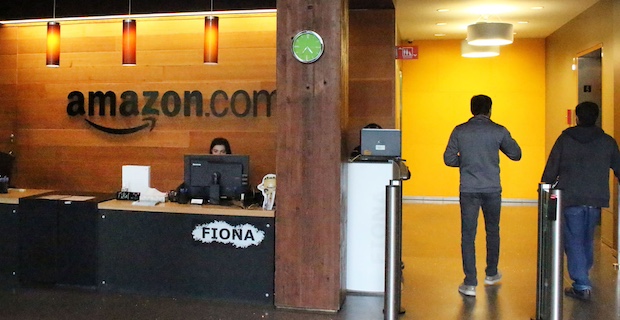The change will come into force from January, Amazon's chief executive Andy Jassy said in a memo to staff, external. "We’ve decided that we’re going to return to being in the office the way we were before the onset of Covid," he said, adding that it would help staff be "better set up to invent, collaborate, and be connected enough to each other". Mr Jassy has long been known as a sceptic of remote work, but Amazon staff were previously allowed to work from home two days a week. Amazon's push to get corporate staff back into the office has been a source of tension within the firm which employs more than 1.5 million people globally in full-time and part-time roles. Staff at its Seattle headquarters staged a protest last year as the company tightened the full remote work allowance that was put in place during the pandemic.
Amazon subsequently fired the organiser of the protest, prompting claims of unfair retaliation, a dispute that has been taken up with labour officials. In his message on Monday, Mr Jassy said he was worried that Amazon - which has long prided itself on preserving the intensity of a start-up while growing to become a tech giant - was seeing its corporate culture diluted by flexible work and too many bureaucratic layers.
Mr Jassy, who replaced founder Jeff Bezos as chief executive in 2021, said he had created a "bureaucracy mailbox" for staff to make complaints about unnecessary rules and the company was asking managers to reorganise so that managers are overseeing more people. Amazon said those changes could lead to job cuts. In addition to returning to the office five days a week, Amazon said it would end hot-desking in the US, although it will continue in most of Europe. The company said staff could still work from home in unusual circumstances, such as a sick child or house emergency, as was the case before the pandemic. But unless they have been granted an exemption, Mr Jassy said: "Our expectation is that people will be in the office outside of extenuating circumstances."
UK approach
Amazon's stance contrasts with the UK government's approach, which has promised to make flexible working a default right from day one as part of a new employment rights bill due to be published next month. Business Secretary Jonathan Reynolds told the Times newspaper, external that the government wants to end the "culture of presenteeism", and said there were "real economic benefits" to people working from home. He said there was a balance to be struck, but flexible working arrangements could help businesses recruit from a wider pool of people.
Graeme from Northumberland, who didn't want us to use his surname, mainly works from home and believes "you just get so much more done". The difference between that and office work was "night and day" in terms of productivity, he said. In the office people can come over for a chat, or to make requests, and then it can be more difficult to get back into a work flow, he said. However, he added that the socialising aspect of working in an office was also important.


 After Nesil Caliskan a by-election will be held in Jubilee ward in Enfield
After Nesil Caliskan a by-election will be held in Jubilee ward in Enfield Publishing the analysis, Labour’s Cllr Ergin Erbil said Everybody in Enfield deserves basic rights
Publishing the analysis, Labour’s Cllr Ergin Erbil said Everybody in Enfield deserves basic rights Gaza-Israel conflict Statement from Cllr Ergin Erbil, Leader of Enfield Council
Gaza-Israel conflict Statement from Cllr Ergin Erbil, Leader of Enfield Council Cllr Ergin Erbil was elected as the new Leader of Enfield Council
Cllr Ergin Erbil was elected as the new Leader of Enfield Council The European Union called on Turkey to uphold democratic values
The European Union called on Turkey to uphold democratic values Turkish citizens in London said Rights, Law, Justice
Turkish citizens in London said Rights, Law, Justice The Council of Turkish Cypriot Associations Geneva response letter
The Council of Turkish Cypriot Associations Geneva response letter Sustainable Development and ESG, Will This Become the Course for Turkic World
Sustainable Development and ESG, Will This Become the Course for Turkic World Saran Media And Euroleague Basketball Extend Media Rights Partnership for Four More Years
Saran Media And Euroleague Basketball Extend Media Rights Partnership for Four More Years Will Rangers be Jose Mourinho’s next victim?
Will Rangers be Jose Mourinho’s next victim? Jose Mourinho's Fenerbahce face Rangers on Thursday
Jose Mourinho's Fenerbahce face Rangers on Thursday Inzaghi stated that they felt the absence of our national player Hakan Çalhanoğlu
Inzaghi stated that they felt the absence of our national player Hakan Çalhanoğlu Barclays has become the biggest UK lender so far to cut mortgage rates
Barclays has become the biggest UK lender so far to cut mortgage rates THE SPRING STATEMENT EXPLAINED, UK ECONOMIC OUTLOOK AND GROWTH FORECASTS
THE SPRING STATEMENT EXPLAINED, UK ECONOMIC OUTLOOK AND GROWTH FORECASTS Launch of Made in Enfield gift shop to celebrate local artists and designers
Launch of Made in Enfield gift shop to celebrate local artists and designers Trial used smart Wi-Fi sensors for live building occupancy data to optimise
Trial used smart Wi-Fi sensors for live building occupancy data to optimise
















